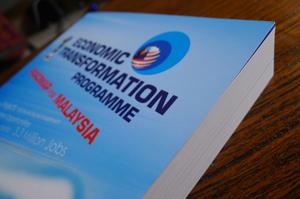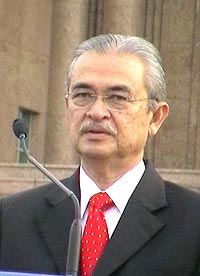The lower income groups may not be ready to face the challenges that will come once the Economic Transformation Programme (ETP) goes into full swing, said a senior academician.
Prof Rugayah Mohamed said the government needs to find effective ways to help Malaysians in the lower-middle and low-income groups to fully understand - and be prepared - to meet the ETP objectives.
 “The government’s intention is to rope them in but when the ETP is implemented, they may not be up to the mark,” she said after sitting as a panellist to discuss ‘Malaysia’s Economic Transformation Going Forward’ during the National Economic Outlook Conference 2011-2012 in Kuala Lumpur today.
“The government’s intention is to rope them in but when the ETP is implemented, they may not be up to the mark,” she said after sitting as a panellist to discuss ‘Malaysia’s Economic Transformation Going Forward’ during the National Economic Outlook Conference 2011-2012 in Kuala Lumpur today.
Rogayah, a deputy vice-chancellor at Universiti Tun Hussein Onn in charge of research and innovation, stressed that issues such as apathy and a lack of understanding among those in the lower strata of society could leave them unable to meet the demands of a high-income economy.
Speaking during the panel discussion, she stressed that economic transformation is a holistic concept that should not only focus on achieving certain figures or “macro fundamentals”.
“Economic transformation means not only increased income, but also increasing welfare and social well being through reduction of the crime rate, corruption, rent-seeking activities, (and) reaching out to the citizens to be united in the national aspirations.
“The word economy is (referring to) the whole country... you’re looking from the top and looking at all the agents in the economy. If one is ill or sick, the others will feel the impact.”
‘Where are local workers?’
Rogayah, who has been an economist for 33 years, also pointed out that Malaysia is facing a very real problem in building a sufficient pool of home-grown unskilled labour.
She stressed that the over-dependence on foreign labour in various industries, particularly agriculture and manufacturing, could lead to a collapse of these sectors as there are no locals to replace foreign workers.
Recounting a
 study she conducted on the commercial viability of the local goat industry, which was launched under former premier Abdullah Ahmad Badawi
(left)
, Rogayah noted that many industry players had to close shop not because of the lack of creativity or innovation, but due to the absence of an available workforce.
study she conducted on the commercial viability of the local goat industry, which was launched under former premier Abdullah Ahmad Badawi
(left)
, Rogayah noted that many industry players had to close shop not because of the lack of creativity or innovation, but due to the absence of an available workforce.
“Until today, we cannot find (local) workers... I do not know what has happened to our youth. Where are they?
“We don’t have the labour force. These are fundamental questions. We talk about macro- economics all the time but we have to be very realistic. Where are the young to fill in the gap in the labour force?”
Rogayah warned that, if the local labour shortage is not addressed within the framework of the ETP, it would bring dire consequences not only for Malaysian industries but also on daily life.
“I can assure you, we will have to import our vegetables, import our food products,” she added.
The other panellists were Prof Ahmad Zubaidi Baharumshah of the Faculty of Economics and Management, Universiti Putra Malaysia; Wilson Baya Dandot, CEO, Regional Corridor Development Authority of Sarawak; and Pang Teck Wai, CEO of POIC Sabah Sdn Bhd.
Huge income gap immoral, says NUBE

